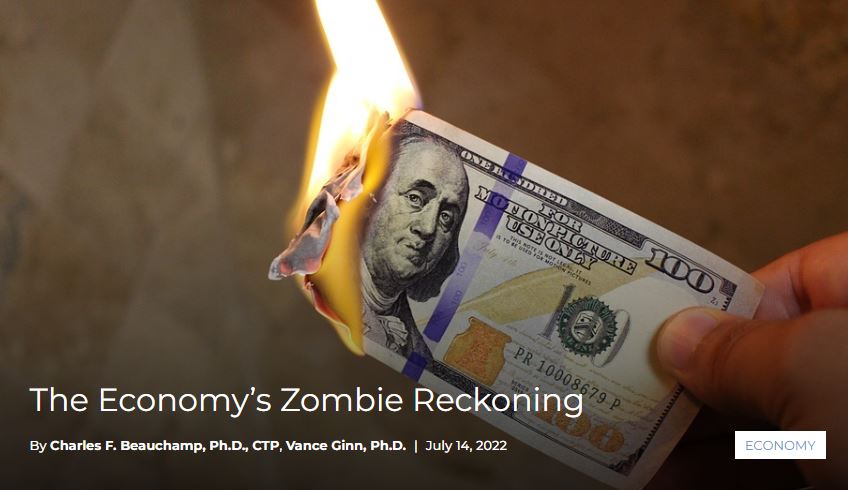|
Only a bolt of lightning or a dose of radiation can awaken zombies in the movies; the same isn’t true for an economic zombie. In the latter’s case, it took many years—especially the last two years—of deficit-spending fueling excessive money printing to get this day of reckoning for the U.S. economy with frequent mentions of “stagflation” and “recession.”
An economic zombie is harder to kill than in the movies, as they last as long as the policies that raised them, causing much avoidable pain to Americans—especially to those who can least afford it. Bad policies must stop so this scary movie disrupting our lives ends. Zombie firms are those that are fragile as debt mainly funds their operations. They rose in the U.S. since 2008 as the Federal Reserve held interest rates too low for too long and Congress passed numerous bailouts and spending packages. Congress’ recent actions of even worse deficit-spending packages that led to a 20% increase in the national debt since January 2020 to a whopping $30.5 trillion—or $90,000 owed per American—helped prop up many more zombie firms. Thankfully, the Fed is finally fighting the 40-year high inflation rate by (slightly) reducing its balance sheet to raise its federal funds rate target. But it’s well-behind the curve as it should be tightening much faster according to the well-respected Taylor rule. It’s also good news that Congress doesn’t look poised to pass any more reckless deficit-spending packages—thanks to Senate Republicans, Democratic Sen. Joe Manchin, and Sen. Kyrsten Sinema—but a new attempt is brewing. When these bad policies stop, there will be a correction of these government failures that created zombie firms to turn to dust. Evidence of this is small businesses—which are the most sensitive to these escalating costs—cutting 91,000 jobs in May, making it three out of four months with job losses at small businesses. And according to a recent WSJ survey, six out of ten small-business owners expect the economy to be worse in the next year, matching the record low in April 2020. Dying zombie firms will put downward pressure on labor markets as they cut workers and drop open positions to stem higher costs, which will reduce the inflated number of job openings exceeding unemployed workers. With so many workers not looking for a job, there are also many zombie workers. Millions of workers haven’t returned since the recession and others are jumping from one job to another to keep up with rapidly rising inflation and to find the “best” match. The handouts without work requirements—such as “stimulus” checks, child tax credit payments, and expanded Medicaid over the last two years—contributed to this situation as the personal savings rate jumped to a historic high of 33% in April 2020 and stayed elevated for a while. But now that rate is dropping like it’s hot, as people are running through their savings—with the latest rate of 5.4% in May 2022 being the lowest in nearly 14 years. If zombie firms begin to crumble and zombie workers don’t search for a job, the resulting zombie economy will hit a wall. The result will be a rising unemployment rate, soaring inflation, and stagnating economy, which would extend this costly period of stagflation. This weakens President Biden’s argument that the strength of the labor market can mitigate the effects of inflation, as inflation-adjusted hourly earnings remain negative. The Fed is way behind the inflationary curve, and it’s the primary entity that can correct this walking dead inflation situation. Instead of blaming “corporate greed” or “Putin’s price hikes,” President Biden, Congress, and the Fed must cut regulations, spend and tax less, and print less money. The zombie economy’s reckoning is likely a recession with real GDP declines of in the first quarter and another likely decline in the second quarter. No wonder President Biden’s approval rating is hitting record lows and his disapproval rating hitting record highs. To awaken the zombie economy, there needs to be responsible fiscal and monetary policies in Washington. This includes pro-growth spending, regulating, and taxing reductions to support expanding supply and aggressive quantitative tightening to deflate demand. Until then, the zombie economy will continue to bring deeper, longer-lasting pain. Published at TPPF with Charles Beauchamp Comments are closed.
|
Vance Ginn, Ph.D.
|


 RSS Feed
RSS Feed